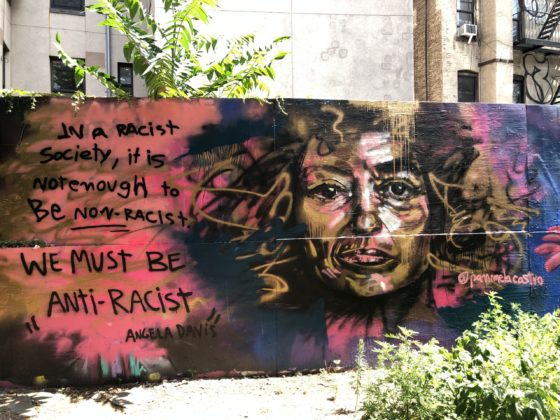
Early last summer, I read Ibram X. Kendi’s 2016 book, Stamped from the Beginning: The Definitive History of Racist Ideas in America. It’s an amazing book I highly recommend, and I recommended it in my most recent post, Be an Antiracist. It was in that book that I first heard the terms antiracism and antiracist.
Soon after I read Kendi’s book, I was walking on Houston Street in Manhattan, when I came upon a small park with many walls of street art. I’m a big fan of street art, and I was particularly taken by a quote from the political activist Angela Davis, whom I had just read quite a bit about in Kendi’s book: “In a racist society, it is not enough to be non-racist, we must be anti-racist.”
Three months later, in October, I heard Kendi interviewed on one of my favorite podcasts, “The Ezra Klein Show”. Kendi’s newest book, How to Be an Antiracist, had come out and even though I had read Kendi’s earlier book, I hadn’t heard about his new book, which I soon bought and read and also recommend. (Both were among the best books I read in 2019.)
Early in the interview, as Kendi explained the difference between not being racist, and being antiracist, he cited the Angela Davis quote.
It felt to me like one of those moments when you are thinking about buying a certain type of car, and suddenly everywhere you look you see people driving that car. It’s not that there are suddenly lots of those cars, it’s that the car has entered your awareness. For me, antiracism and the concept of being an antiracist had entered my awareness.
Fast forward to today and the words and concepts of antiracism and being antiracist have entered the awareness of a tremendous number of people around the world as a result of the protests following the killing of George Floyd. I think it’s safe to say the words antiracist and antiracism have been said and written more times in the last three weeks than the combined number of times they had been said or written before that. (And Kendi’s How to Be an Antiracist is the number two bestseller on Amazon.)
With the power of the worldwide protests, and the promises of politicians to enact change, progress feels real. History tells us the near-term changes won’t be enough, which is one of the reasons why it’s not enough to be non-racist. We must be antiracist.
Here are some notes I made when I listened to the Kendi interview:
Racism: a powerful collection of racist policies that lead to racial inequity and are substantiated by racist ideas.
Racist polices: any policy that leads to racial inequity. Racial language in the policy doesn’t matter. Intent of the policymaker doesn’t matter. Even the consciousness of the policymaker that it is going to lead to inequity doesn’t matter. It’s all about the fundamental outcome.
Racial idea: any idea that suggests a racial group is superior or inferior to another group in any way.
In a moment when you say black people are lazy, you are being racist. When you say you realize black people are not lazy, in that moment you are being an anti-racist.
If that’s not clear to you, read it again. Or read Kendi’s books. Or listen to the full Kendi interview with Klein.
Unless you have been in a cave somewhere, you have read many powerful words these past few weeks, whether in op-ed pieces, on social media, or on posters carried by protesters, like this one, which I find quite clear:
TREAT RACISM LIKE COVID-19
-
-
- Assume you have it
- Listen to experts about it
- Don’t spread it
- Be willing to change your life to end it
-
I also like this one, which I saw on Instagram: “Strong people stand up for themselves. Stronger people stand up for others.” And with those words, I leave you today with these instructions: Be an antiracist—intentionally, deliberately, and unapologetically stand up for others.
Be well,
David
